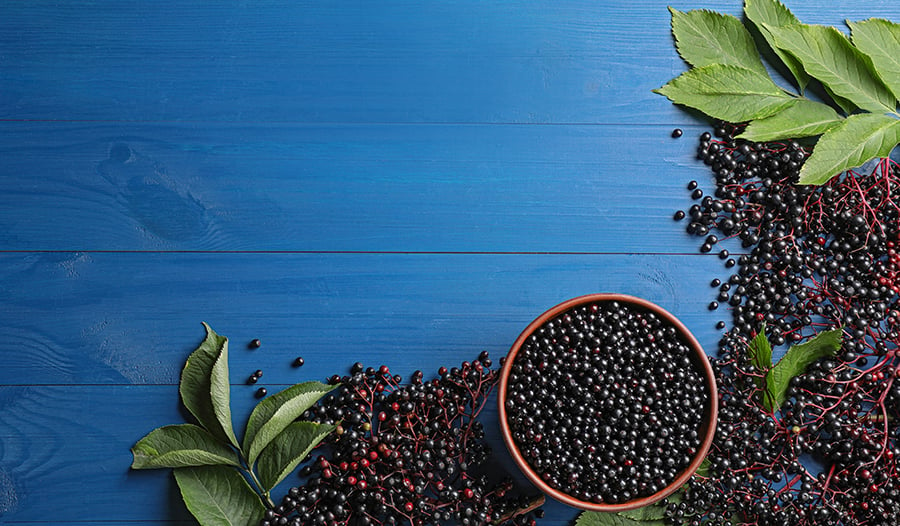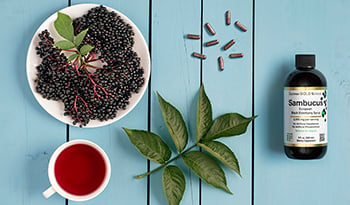Elderberry 101: A Comprehensive Guide to Benefits, Uses, and Side Effects

Elderberry, derived from the European elder tree, is a small, dark purple-black berry used for centuries in traditional medicine. In recent years, it has gained widespread popularity as a natural remedy due to its impressive health benefits and various uses. Elderberry is believed to boost immunity, treat cold and flu symptoms, and address various health concerns.
This article provides a comprehensive guide to elderberry, exploring its nutritional profile, benefits, uses, and potential side effects.
What Is Elderberry?
Elderberry refers to the dark purple-black berries of the elder tree, scientifically known as Sambucus nigra. Although indigenous to Europe, North Africa, and portions of Asia, the elder tree is also found in North America.
The elderberry plant belongs to the Adoxaceae family and is a deciduous shrub or small tree that thrives in damp environments, such as riverbanks and wooded areas. The elder tree produces white flowers in late spring or early summer, which develop into small, dark berry clusters by late summer or early autumn.
The ripe berries are small and round, with a deep purple-to-black color. They have a tart flavor and are not generally consumed raw. Instead, elderberries are commonly used after being cooked or processed.
The flowers and leaves have been traditionally used for pain relief, reducing swelling and inflammation, stimulating urine production, and inducing sweating. The plant's bark was used as a diuretic and a laxative to induce vomiting.
Elderberry juice or dried berries are used as a laxative and diuretic in traditional medicine in addition to their traditional uses for treating the flu, infections, sciatica, headaches, dental pain, heart discomfort, and nerve pain.
Nutritional Profile of Elderberries
Elderberries are not only delicious but also incredibly nutritious. These berries are packed with vitamins, minerals, and antioxidants. Elderberries are particularly rich in the following nutrients:
- Vitamin C: Elderberries are a great source of Vitamin C, with just a small serving providing a significant portion of the daily intake. A cup of elderberries contains 52 mg of Vitamin C, which accounts for 57% of the daily value. Vitamin C helps keep the immune system healthy, protects the body from free radicals, and makes skin healthy.
- Vitamin A: Elderberries are a rich source of beta-carotene, a precursor to Vitamin A, essential for healthy skin, vision, and immunity.
- Anthocyanins: Elderberries owe their deep purple-black color to anthocyanins, powerful antioxidants with anti-inflammatory and immune-boosting properties.
- Quercetin: Elderberries contain quercetin, a flavonoid with antioxidant and anti-inflammatory properties.
- Dietary Fiber: Elderberries are also rich in dietary fiber, which promotes digestive health, maintains blood sugar levels, and contributes to feelings of fullness.
- Low-Calorie: Elderberries are a nutrient-dense and healthy addition to various dishes, as they are relatively low in calories.
It's important to note that the nutrient content of elderberries may vary based on factors such as the fruit's ripeness, growing conditions, and the methods used for processing. Therefore, choosing fresh, ripe, and organically grown elderberries is always best to ensure you get the most nutrients.
6 Health Benefits of Elderberry
Learn about common uses of elderberry and how it may help with certain health concerns.
1. May Support the Immune System
One of the main reasons elderberries are becoming more popular is due to their impressive immune-boosting properties. They are abundant in antioxidants, which support immune function, reduce oxidative stress, and neutralize free radicals in the body. In addition, studies have shown that elderberry polyphenols can support immune defense by increasing the number of white blood cells in rats.
The presence of anthocyanins and Vitamin A and Vitamin C in elderberries further enhances its immune-enhancing effects. By incorporating elderberries into your diet, you can provide your body with the necessary nutrients to maintain a healthy immune system.
2. May Reduce Cold and Flu Symptoms
Elderberry has been traditionally used to alleviate symptoms of colds and flu. Recent research has suggested that elderberry extracts help reduce the duration and severity of these illnesses through inhibition of influenza virus replication and easing respiratory symptoms.
Commercial elderberry preparations for colds are available in various forms, such as liquids, capsules, lozenges, and gummies. A group of 312 air travelers who took capsules containing elderberry extract (300 mg) three times daily before their flights discovered that those who got ill had fewer symptoms and felt better faster.
3. May Have Anti-Inflammatory Properties
Elderberries contain anthocyanins, which have potent anti-inflammatory effects. Chronic inflammation contributes to various diseases like heart disease and arthritis. Elderberry's anti-inflammatory properties make it a valuable addition to a holistic approach to wellness, potentially aiding in the prevention and management of inflammatory conditions.
4. May Promote Heart Health
Elderberries contain compounds that may positively impact heart health. Studies have suggested that elderberry may help lower blood pressure and reduce cholesterol levels, contributing to cardiovascular well-being. A diet rich in flavonoids, like anthocyanins, has also been associated with a decreased risk of cardiovascular disease.
In a study involving mice with excessive cholesterol, a black elderberry-containing diet decreased cholesterol levels in the aorta and liver but not in the blood. Additional research has demonstrated that the consumption of foods containing elderberry polyphenol extract by rats decreases blood pressure. In addition, elderberries may help lower the amount of uric acid in the blood. The health effects of uric acid are bad for your heart since it causes high blood pressure.
5. Rich in Antioxidants
Elderberries are packed with antioxidants, including quercetin, anthocyanins, and Vitamin C. These antioxidants help neutralize free radicals in the body, which can otherwise contribute to cellular damage and aging.
Anthocyanin, present in berries, possesses an antioxidant capacity of 3.5 times that of Vitamin E. Elderberry has been identified as one of the most potent antioxidants, according to two separate studies that compared 15 distinct varieties of berries and wine.
Therefore, regular consumption of elderberries may contribute to overall health by providing a defense against oxidative stress.
6. May Support Diabetes Management
Preliminary research suggests that elderberry may have a beneficial effect on diabetes management. Beneficial for diabetics, the anthocyanins found in elderberries may improve insulin sensitivity and modulate blood sugar levels.
A study revealed that elderberry flowers inhibit the enzyme alpha-glucosidase (α-glucosidase), which aids in reducing blood sugar levels. Furthermore, a study conducted on rats with diabetes showed that administering elderberry improved their blood sugar control.
Dosage and Uses of Elderberry
The recommended oral dosage for adults taking elderberry fruit extracts for two weeks is 1200 mg daily. Common ways to incorporate elderberries into the diet include the following.
Elderberry Syrup
One of the most popular ways to consume elderberries is in the form of syrup. Elderberry syrup is often used as a natural remedy for colds and flu. It can be easily made at home by simmering elderberries with water and sweetening with honey. Many commercial elderberry syrups are also available, providing a convenient option for those seeking immune support.
Teas and Infusions
Another way to enjoy the benefits of the elderberry is through making teas and infusions. Elderberry tea is a soothing and delicious beverage made by steeping dried berries in hot water. It can be consumed on its own or mixed with other herbs for added benefits. Elderberry's unique taste and potential health advantages make it a favorite among herbal tea enthusiasts.
Capsules and Supplements
Elderberry is available in capsule and supplement form for those who prefer a more convenient option. These products often contain concentrated elderberry extracts, providing a convenient way to incorporate elderberry into a daily wellness routine. However, choosing reputable brands is important to ensure product quality and efficacy.
Tinctures
Elderberry tinctures offer a tasty and creative way to enjoy the benefits of elderberry. These can be added to toast, used as a recipe sweetener, or taken directly for a quick and delicious health boost.
Potential Side Effects and Considerations
While elderberry is generally well-tolerated by most individuals, there are some considerations and potential side effects to be aware of.
Unripe or Raw Berries
Consuming unripe or raw elderberries is not recommended, as they may contain nausea-inducing substances. Properly cooking or processing the berries eliminates these compounds, making them safe for consumption.
Allergic Reactions
Some individuals may be allergic to elderberries. Allergic reactions can manifest as itching, swelling, or difficulty breathing. If you are prone to allergies or have a known sensitivity to similar fruits, exercise caution when trying elderberry products.
Interactions with Medications
Elderberry supplements may interact with specific medications that suppress the immune system. If you take any medications, especially immunosuppressants, consult your healthcare provider before incorporating elderberry into your routine.
Cyanide Concerns
The seeds and stems of elderberries contain small amounts of cyanide-producing compounds. While the levels are typically low and unlikely to cause harm, avoiding consuming large quantities of these parts is advisable. Properly processing elderberries, such as cooking or drying, reduces the risk of cyanide exposure.
The Bottom Line
Elderberry, a small but mighty fruit used in many natural remedies, has caught the attention of health enthusiasts and researchers alike. It is a natural immune booster with anti-inflammatory properties, reminding us of nature's bountiful benefits for our health and vitality. Although elderberries are highly nutritious, it's imperative to consume them in moderation and be aware of potential side effects, especially when consuming raw or unprocessed plant parts.
Elderberries can be enjoyed in various forms, such as syrup, tea, or incorporated into recipes. They make for a flavorful and nutritious addition to a balanced diet, providing a natural boost to your immune system and overall well-being.
References:
- Cejpek K, Maloušková I, Konečný M, Velíšek J. Antioxidant Activity in Variously Prepared Elderberry Foods and Supplements. Czech J Food Sci. 2009;27.
- European Medicines Agency. Committee on Herbal Medicinal Products (HMPC). Assessment report on Sambucus nigra L., fructus. EMA/HMPC/44208/2012. 28 January 2014.
- Farrell N, Norris G, Lee SG, Chun OK, Blesso CN. Anthocyanin-rich black elderberry extract improves markers of HDL function and reduces aortic cholesterol in hyperlipidemic mice. Food Funct. 2015 Apr;6(4):1278-87. PMID: 25758596.
- He J, Giusti MM. Anthocyanins: natural colorants with health-promoting properties. Annu Rev Food Sci Technol. 2010;1:163-87. PMID: 22129334.
- Kuwabara M. Hyperuricemia, Cardiovascular Disease, and Hypertension. Pulse (Basel). 2016 Apr;3(3-4):242–252. PMID: 27195245; PMCID: PMC4865070.
- Loizzo MR, Pugliese A, Bonesi M, Tenuta MC, Menichini F, Xiao J, Tundis R. Edible Flowers: A Rich Source of Phytochemicals with Antioxidant and Hypoglycemic Properties. J Agric Food Chem. 2016 Mar 30;64(12):2467-74. PMID: 26270801.
- Porter RS, Bode RF. A Review of the Antiviral Properties of Black Elder (Sambucus nigra L.) Products. Phytother Res. 2017 Apr;31(4):533-554. PMID: 28198157.
- Rupasinghe HPV, Clegg S. Total antioxidant capacity, total phenolic content, mineral elements, and histamine concentrations in wines of different fruit sources. J Food Compos Anal. 2007 Mar;20(2):133-137.
- Sidor A, Gramza-Michałowska A. Advanced research on the antioxidant and health benefit of elderberry (Sambucus nigra) in food – a review. J Funct Foods. 2015;18(Part B):941-958.
- Tiralongo E, Wee SS, Lea RA. Elderberry Supplementation Reduces Cold Duration and Symptoms in Air-Travellers: A Randomized, Double-Blind Placebo-Controlled Clinical Trial. Nutrients. 2016 Apr;8(4):182. PMID: 27023596; PMCID: PMC4848651.
- U.S. Food and Drug Administration. Daily Value on the Nutrition and Supplement Facts Labels. Accessed 11.15.23.
- Ulbricht C, Basch E, Cheung L, Goldberg H, Hammerness P, Isaac R, Khalsa KPS, Romm A, Rychlik I, Varghese M, Weissner W, Windsor RC, Wortley J. An evidence-based systematic review of elderberry and elderflower (Sambucus nigra) by the Natural Standard Research Collaboration. J Diet Suppl. 2014 Mar;11(1):80-120. PMID: 24409980.
- US Department of Agriculture. FoodData Central. Accessed 11/14/23.
- Vlachojannis JE, Cameron M, Chrubasik S. A systematic review on the sambuci fructus effect and efficacy profiles. Phytother Res. 2009 Jun 22. PMID: 19548290.
- Wang X, Ouyang YY, Liu J, Zhao G. Flavonoid intake and risk of CVD: a systematic review and meta-analysis of prospective cohort studies. Br J Nutr. 2014 Jan 14;111(1):1-11. PMID: 23953879.
- Wu X, Gu L, Prior RL, McKay S. Characterization of anthocyanins and proanthocyanidins in some cultivars of Ribes, Aronia, and Sambucus and their antioxidant capacity. J Agric Food Chem. 2004 Dec 29;52(26):7846-56. PMID: 15612766.
DISCLAIMER:This Wellness Hub does not intend to provide diagnosis...
















































































 Table of Contents
Table of Contents















